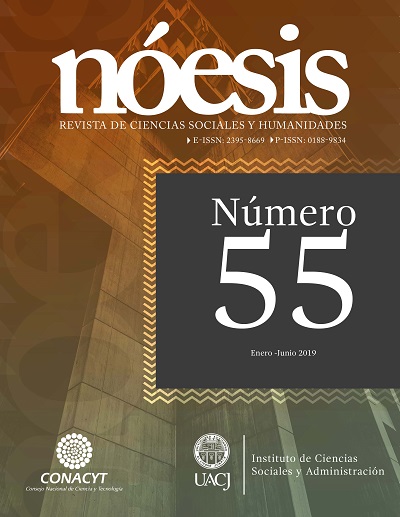Capital accumulation, economic growth and the balance-of-payments constraint: The case of Mexico, 1951-2014
Main Article Content
Abstract
After a critical assessment of both Thirlwall’s long-run growth model and Clavijo’s and Ros’s (2015) model where capital accumulation determines output growth, this paper displays an alternative model in which capital accumulation and the growth rate of capital productivity determine the long-run growth rate of output which is consistent with a constant position of the balance of payments as a percentage of GDP. Then, the latter is applied to inquire the causes accounting for Mexico’s low economic growth rate during 1982-2014. We conclude, on empirical grounds, that the sharp decline in the internal demand for domestic goods and both the rates of net capital accumulation and productivity played a major role in the slowdown of the Mexican economy. The income elasticities of the demand for exports and imports also played a role, albeit to a lesser extent.
Downloads
Article Details

This work is licensed under a Creative Commons Attribution-NonCommercial-ShareAlike 4.0 International License.
References
Barbosa-Filho, Nelson. 2001. The balance of payments constraint: from balanced trade to sustainable debt. BNL Quarterly Review, 54(219): 381-400.
Clavijo, Pedro and Jaime Ros. 2015. La Ley de Thirlwall: una lectura crítica. Investigación Económica, 74(292): 11-40.
Guerrero de Lizardi, Carlos. 2006. Thirlwall’s Law with an emphasis on the ratio of export/import income elasticities in Latin American economies during the twentieth century. Estudios Económicos, 21(1): 23-44.
Hofman, André. 2000. The Economic Development of LATIN AMERICA in the Twentieth Century. Cheltenham: Edward Elgar.
Ibarra, Carlos. 2015. Comentario a ‘La Ley de Thirlwall: una lectura crítica’ de Pedro Clavijo y Jaime Ros. Investigación Económica, 74(292): 41-45.
Lewis, Arthur. 1954. Economic development with unlimited supplies of labour. The Manchester School, 22(2): 139-191. https://doi.org/10.1111/j.1467-9957.1954.tb00021.x
López, Julio. and Alberto Cruz. 2000. “Thirlwall’s Law” and beyond: The Latin American experience. Journal of Post Keynesian Economics, 22(3): 477-495. https://doi.org/10.1080/01603477.2000.11490253
McCombie, John and Anthony Thirlwall. 1997. Economic growth and the balance of payments constraint revisited. In Markets, unemployment and economic policy: essays in honour of G. Harcourt, edited by Arestis, Philip, Gabriel Palma and Malcolm Sawyer. Volume two, London: Routledge, 498-511.
Moreno-Brid, Juan. 1998a. On capital flows and the balance-of payments-constrained growth model. Journal of Post Keynesian Economics, 21(2): 283-298. https://doi.org/10.1080/01603477.1998.11490194
Moreno-Brid, Juan. 1998b. Balance-of-payments constrained economic growth: The case of Mexico. Banca Nazionale del Lavoro Quarterly Review, 51(207): 413-433.
Moreno-Brid, Juan. 1999. Mexico’s economic growth and the balance of payments constraint: A cointegration analysis. International Review of Applied Economics, 13(2): 149-159. https://doi.org/10.1080/026921799101634
Moreno-Brid, Juan and Jaime Ros. 2009. Development and growth in the mexican economy: A historical perspective. New York: Oxford University Press.
Nurkse, Ragnar. 1953. Problems of capital formation in underdeveloped countries. New York: Oxford University Press.
Pesaran, Hashem, Yongcheol Shin and Richard Smith. 2001. Bound testing approaches to the analysis of level relationships. Journal of Applied Econometrics, 16(3): 289-326. https://doi.org/10.1002/jae.616
Pugno, Maurizio. 1998. The stability of Thirlwall’s model of economic growth and the balance-of-payments constraint. Journal of Post Keynesian Economics, 20(4): 559 –581. https://doi.org/10.1080/01603477.1998.11490168
Romer, Paul. 1986. Increasing returns and long run growth. Journal of Political Economy, 94(5): 1002 – 1037. https://doi.org/10.1086/261420
Ros, Jaime and Pedro Clavijo. 2015. Respuesta a Ibarra, Pérez y Vernengo. Investigación Económica, 74(292): 81 – 90.
Shaikh, Anwar and Jamee Moudud. 2004. Measuring capacity utilization in OECD countries: A cointegration method. Annandale-on-Hudson: The Levy Economics Institute.
Solow, Robert. 1956. A contribution to the theory of economic growth. Quarterly Journal of Economics, 70(1): 65 – 94.
Syrquin, Moshe. 1988. Patterns of structural change. In Handbook of development economics, edited by Chenery, Hollis and Thirukodikaval Srinivasan. Amsterdam: Elsevier, 203-273.
Thirlwall, Anthony. 1979. The balance of payments constraint as an explanation of international growth rate differences. Banca Nazionale de Lavoro, 32(128): 45-53.
Thirlwall, Anthony and Mohammed Hussain. 1982. The balance of payments constraint, capital flows and growth rate differences between developing countries. Oxford Economic Papers, 34(3): 498-510.

